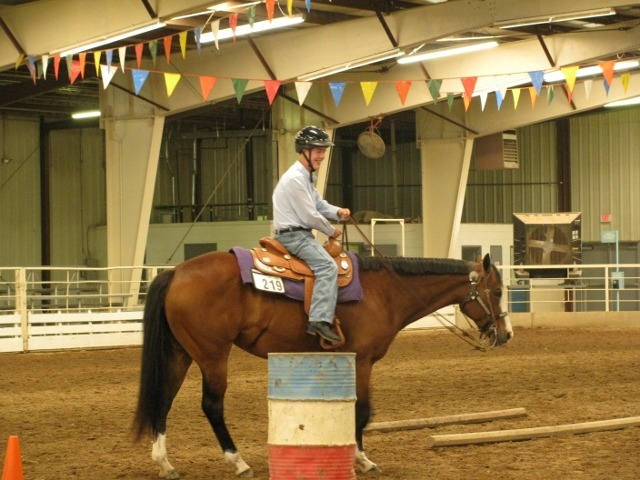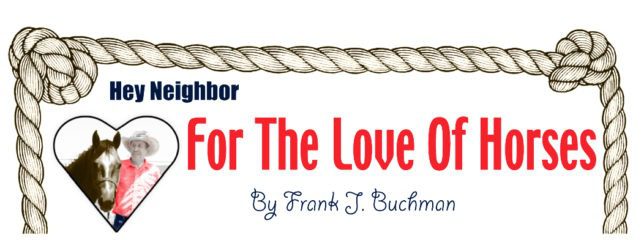Special people require special horses in special divisions, and then they all become the most special champions, in their own special way.
Horses have long been credited for being especially beneficial to developing all levels of skills for those with a wide array of disabilities.
Organizations involved in the horse world fortunately have stepped on board to better serve those special people.
Efforts are expanding and changing as the fact, of just how important special horses are to special people, is being more broadly understood and appreciated.
Ben Johnson is the always-smiling example of just how true that is.

The grin becomes wider, and is accompanied by a “thumbs up,” as the 22-year-old horseman, born with a development disorder, had his name called as results were announced after the Equestrians with Disabilities (EWD) class during the American Quarter Horse Association Show at the recent Kansas State Fair in Hutchinson.
“Highlight of Ben’s life is riding his bay mare Lily in these shows,” declared dad Steve Johnson of Arkansas City.
“The classes help build Ben’s motor skills and level of concentration,” insisted Dad, a lifelong horseman who first put Ben in the front of the saddle with him when his son was still quite young.
With disabilities typical of autism, and deprived coordination, Ben’s physical and mental skills can only reach a certain limited level. However, riding and working with all aspects of his horses are credited with sharply enhancing the development.
Johnson and his wife, Arlene, and their daughter, Renee (Freund), three years older than Ben, would always lead the horses when Ben was riding, until the South Central Stock Horse Association (SCSHA) added the EWD class to a show.
“Riders had to ride independently, so Ben began riding unassisted. We could see that it improved his level of concentration, and reduced internal and external distractions,” Johnson said.
Classes require participants to memorize a set pattern and ride their horses through the maneuvers like turning left, right, backing, etc. “Ben’s level of concentration really has improved,” Johnson credited.
However, competition does include those with various levels of disabilities. “Ben’s is still easily distracted, so he generally doesn’t place high in classes,” Johnson admitted.
That’s almost insignificant. “Ben is still always enjoying himself, is very personable and making friends. He’s one of the happiest exhibitors at every show,” credited Johnson.
Still, yearend awards are based on accumulated points, and Ben seldom misses a show, so he’s collected several trophy buckles. “He really likes his buckles, and it makes us proud, too,” Johnson said.
Of course, all of this is only possible by having the right horse for Ben to ride. “We had a gray mare called Missie. She is a perfect baby setter. When Ben would get lopsided in the saddle, Missie would just move right over under him,” Dad noted.
Renee rode a number of top show horses as a youth, and trained several horses during her 4-H career, including Lily. So, when Renee left for college in 2007, the gray mare was sold to another family needing a suitable horse for a rider with disabilities.
“Lily was just three-years-old, but Ben just clicked perfectly with her; she’s eight now,” explained Johnson, noting that the mare had a foal last year that had a matching personality.
“Ben even showed that colt in EWD showmanship classes this year,” Dad added. It was heartbreaking when the family recently lost the yearling, due to an untreatable ailment from a birth defect.
“It’s my opinion that there are certain bloodlines more suitable to becoming horses for those with disabilities,” Johnson indicated.
Nevertheless, it does make a difference how the horses are handled. “These are very smart horses, and they want to take care of their riders, so to speak,” Johnson insisted.
“I had a palomino called Stevie that was being used by a handicapped riding organization, but they started having problems with him becoming irritable. I took him back, worked with him, and now he’s fine again. The horse needed more of challenge than just walking in a circle all of the time,” Johnson contended.
There are an increasing number of handicapped and therapeutic riding programs in the Midwest making for large entries in some of the EWD classes at horse shows, with 14 entries not uncommon.
The American Quarter Horse Association Equestrians with Disabilities program is open to people with physical or mental disabilities.
There are eight classes including showmanship at halter, walk /trot hunt seat equitation on the flat, walk/trot/canter hunt seat equitation, walk/jog Western horsemanship, walk/jog/lope Western horsemanship, walk/jog trail, advanced showmanship and advanced trail.
Each entry must have a handler to help with the safety of the rider. Judging criteria consists of rider’s balance, rider’s seat, use of aids, ability to follow directions, ring etiquette, safety and sportsmanlike conduct.
Ben competes in Western tack in EWD showmanship, EWD walk/jog horsemanship and EWD walk/jog trail.
Dad Johnson clarified: “Ben’s balance and coordination are insufficiently developed yet for him to lope more than a few strides, thus preventing him from riding in the three gaited classes, yet.”
While the EWD events are relatively new to shows, judges are sometimes not familiar with the unique patterns. So, Ben often will say: “You talk to the judge, Dad.”
When the competition is ready to get underway, Ben will greet either the judge or the ring steward: “Hi Judge,” while trying to give him or her a “High Five.”
“We really appreciate the EWD division at the Quarter Horse shows, even though sometimes going to those can become expensive. So, we are grateful for having EWD classes, patterned somewhat similarly, at SCSHA shows, that are closer to home, and with lower fees,” noted Johnson, who serves as president of that group, where he also competes in his own divisions.
While there are only EWD classes for independent riders now, Johnson would like to see the addition of those where competitors can be assisted during the show, whether horseback or on-foot.
“Now, the therapeutic riding groups often just bring the competitors who can ride independently, but by adding assisted-riding competitions, twice as many participants could ride, with the same number of horses from one organization,” Johnson said.
Both Renee and Ben were home schooled by Arlene, a graduate teacher, like her daughter, who now teaches at Waverly. “Both of the children were in 4-H, when Renee would often assist Ben with his projects,” noted Johnson, crediting 4-H club work and horse show activities with importantly contributing to their children’s life skills development.
With 81 acres on the Cowley County home place, Johnson, a GE Aviation engineer traveling worldwide, has also acquired an equal Coffey County acreage near his daughter at Waverly.
“I’d like to take early retirement, possibly do some consulting, and develop an assisted riding program for people with disabilities,” revealed Johnson, who would also likely do both horse and rider training as part of the heartfelt endeavor.
As might be expected, Johnson, his wife and daughter have a distinct interest in causes of genetically influenced disabilities, and dedicatedly continue to study the largely unknown of such.
“We do know the positive therapeutic effect that horses can have on physical and mental disabilities for all levels and all ages. We want to help and encourage their development with horses in every way we can,” Johnson concluded.
